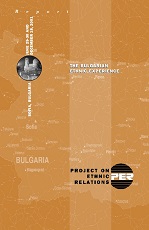The Bulgarian Ethnic Experience
The Bulgarian Ethnic Experience
Contributor(s): Allen H. Kassof (Editor), Livia Plaks (Editor)
Subject(s): Nationalism Studies, Inter-Ethnic Relations, Ethnic Minorities Studies
Published by: PER Project on Ethnic Relations
Keywords: Pomaks; Roma in Bulgaria; Turks in Bulgaria;
Summary/Abstract: This is a report of two discussions that took place in Sofia, Bulgaria, on June 29-30 and December 18, 2001, respectively, between Bulgarian government and party leaders and the leaders of the Movement for Rights and Freedoms (MRF), Bulgaria’s predominantly ethnic Turkish party.
Bulgaria is home to one of the most unusual interethnic arrangements in Southeastern Europe. The leadership of the large (almost 10 per cent of the population) Turkish minority, which might be expected by some to be militant in pressing for special status and protections along ethnic lines, has instead announced its intention to pursue a civic model as the basis for its efforts to improve the conditions in which that country’s Turks and Pomaks (Bulgarian-speaking Muslims) live.
To Americans and others accustomed to the notion of a social order that treats its members as individual citizens first and only then as members of ethnic groups, this will sound quite familiar. But in the complex ethnic worlds of this region, it is a unique exception that merits special attention. For example, Hungarians living outside Hungary, who make up Central Europe’s largest minority, conduct highly organized political campaigns in Romania, Slovakia and Serbia, with the aim of maintaining and strengthening Hungarian cultural identity. And the Albanians in Kosovo, Macedonia, and south Serbia have gone to war with their neighbors over the issue of their rights and status.
Series: PER Reports
- Page Count: 24
- Publication Year: 2001
- Language: English
- Content File-PDF

